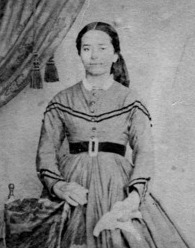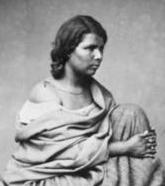 New Orleans Outrage or the Slave Girl Mindset, was witnessed by Union officers and their men. Most Union troop’s feelings of disgust and disbelief, branded their minds and souls with visions, that would haunt personal nightmares for the rest of their lives. In New Orleans, General Butler reigned supreme and he passed judgement on many slave-owners, as Alfred Burnett relates in eye-witness account of the details regarding this peculiar institution.
New Orleans Outrage or the Slave Girl Mindset, was witnessed by Union officers and their men. Most Union troop’s feelings of disgust and disbelief, branded their minds and souls with visions, that would haunt personal nightmares for the rest of their lives. In New Orleans, General Butler reigned supreme and he passed judgement on many slave-owners, as Alfred Burnett relates in eye-witness account of the details regarding this peculiar institution.
“One Sunday morning, late last summer, as I came down-stairs to the breakfast-room, I was surprised to find a large number of persons assembled in the library. When I reached the door, a member of the staff took me by the arm and drew me into the room toward a young and delicate mulatto girl, who was standing against the opposite wall, with the meek, patient bearing of her race, so expressive of the system of oppression to which they have been so long subjected. Drawing down the border of her dress, my conductor showed me a sight more revolting than I trust ever again to behold. The poor girl’s back was flayed until the quivering flesh resembled a fresh beefsteak scorched on a gridiron. With a cold chill creeping through my veins, I turned away from the sickening spectacle, and, for an explanation of the affair, scanned the various persons about the room.
In the center of the group, at his writing-table, sat the General. His head rested on his hand, and he was evidently endeavoring to fix his attention upon the remarks of a tall, swarthy-looking man who stood opposite, and who, I soon discovered, was the owner of the girl, and was attempting a defense of the foul outrage he had committed upon the unresisting and helpless person of his unfortunate victim, who stood smarting, but silent, under the dreadful pain inflicted by the brutal lash.
By the side of the slaveholder stood our Adjutant-General, his face livid with almost irrepressible rage, and his fists tight-clenched, as if to violently restrain himself from visiting the guilty wretch with summary and retributive justice. Disposed about the room, in various attitudes, but all exhibiting in their countenances the same mingling of horror and indignation, were other members of the staff—while near the door stood three or four house-servants, who were witnesses in the case.
To the charge of having administered the inhuman castigation, Landry (the owner of the girl) pleaded guilty, but urged, in extenuation, that the girl had dared to make an effort for that freedom which her instincts, drawn from the veins of her abuser, had taught her was the God-given right of all who possess the germ of immortality,—no matter what the color of the casket in which it is hidden. I say “drawn from the veins of her abuser,” because she declared she was his daughter; and every one in the room, looking upon the man and woman confronting each other, confessed that the resemblance justified the assertion.
After the conclusion of all the evidence in the case, the General continued in the same position as before, and remained for some time apparently lost in abstraction. I shall never forget the singular expression on his face. I had been accustomed to see him in a storm of passion at any instance of oppression or flagrant injustice; but on this occasion he was too deeply affected to obtain relief in the usual way. His whole air was one of dejection, almost listlessness; his indignation too intense, and his anger too stern, to find expression even in his countenance.
Never have I seen that peculiar look but on three or four occasions similar to the one I am narrating, when I knew he was pondering upon the fatal curse that had cast its withering blight upon all around, until the manhood and humanity were crushed out of the people, and outrages such as the above were looked upon with complacency, and the perpetrators treated as respected and worthy citizens, and that he was realizing the great truth, that, however man might endeavor to guide this war to the advantage of a favorite idea or a sagacious policy, the Almighty was directing it surely and steadily for the purification of our country from this greatest of national sins.
But to return to my story. After sitting in the mood which I have described at such length, the General again turned to the prisoner, and said, in a quiet, subdued tone of voice—
“Mr. Landry, I dare not trust myself to decide to-day what punishment would be meet for your offense, for I am in that state of mind that I fear I might exceed the strict demands of justice. I shall, therefore, place you under guard for the present, until I conclude upon your sentence.”
A few days after, a number of influential citizens having represented to the General that Mr. Landry was not only a “high-toned gentleman,” but a person of unusual “AMIABILITY” of character, and was, consequently, entitled to no small degree of leniency, he answered that, in consideration of the prisoner’s “high-toned” character, and especially of his “amiability,” of which he had seen so remarkable a proof, he had determined to meet their views, and therefore ordered that Landry give a deed of manumission to the girl, and pay a fine of five hundred dollars, to be placed in the hands of a trustee for her benefit.
 Most would agree that General Butler was more than lenient with Mr. Landry. However, from Burnett’s description, it seems that Butler and Staff were about at the end of their tether with the people and the customs of New Orleans. Some, less patient types, felt that the Union officials, should hang’em all. Lincoln transferred Butler and assigned General Banks to oversee New Orleans. With Banks at the helm, who knew what would transpire.
Most would agree that General Butler was more than lenient with Mr. Landry. However, from Burnett’s description, it seems that Butler and Staff were about at the end of their tether with the people and the customs of New Orleans. Some, less patient types, felt that the Union officials, should hang’em all. Lincoln transferred Butler and assigned General Banks to oversee New Orleans. With Banks at the helm, who knew what would transpire.
This New Orleans Outrage, is just one tale of thousands and the Slave Girl Mindset of the Planter Aristocracy of Slavedom would not be easily overcome with legislation alone. An ingrained mentality and soul-rot pervaded the Slave States, taking generations to begin and solidify a dynamic change.
Bummer


From my family research i believe the Landry is my GRT GRT Grandfathers brother. I have found evidence to to support this and i am trying to track what happened to the girl after she was freed.
For this he became known as Beast Butler? Sounds like he carried himself with amazing restraint here. Wonder if the poor woman’s crime had something to do with denying of favors – this guy sounds like he would expect it whenever he wanted it.
Louis,
Believe that “The Beast” must have worked both sides of the street. This must have been one of his compassionate days. Guys that treated any human like this needed the rope.
Just the thoughts of an “old guy.”
Bummer
General Butler made a good decision. It was more important than punishing the abuser,although i think he could have done both.
Betty,
Thanks for sharing. Butler sure had more patience than this “old guy.” This type of atrocity was to rampant to deal with sanely. Thanks for the read.
Bummer